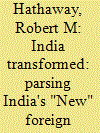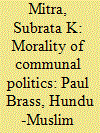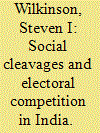| Srl | Item |
| 1 |
ID:
057008


|
|
|
|
|
| Publication |
2003.
|
| Summary/Abstract |
With the end of the Cold War, the dissolution of the Soviet Union, and the collapse of the old economic order in India a dozen years ago, the outmoded methods New Delhi had employed for four decades to engage the world were no longer tenable. C. Raja Mohan, one of India’s leading strategic thinkers, has traced the remarkable transformation in New Delhi’s foreign policy during the 1990s in Crossing the Rubicon, a thoughtful new study of the ideas shaping Indian diplomacy. Mohan highlights five changes in the conceptual underpinnings guiding Indian foreign policy since the early 1990s: a shift from domestically focused socialism to a globalized free market economy; a de-emphasis on politics in favor of economics; an abandonment of New Delhi’s earlier infatuation with “Third Worldism” and non-alignment; a rejection of anti-Westernism; and a loss of idealism. These new forces have left India, Mohan contends, with a foreign policy infinitely more suitable for meeting the challenges of the 21st century. New Delhi is now poised, he adds, to break out of the South Asian box in which it has been confined, and assume its rightful place among the world’s leading powers.
|
|
|
|
|
|
|
|
|
|
|
|
|
|
|
|
| 2 |
ID:
057009


|
|
|
|
|
| Publication |
2003.
|
| Summary/Abstract |
This review argues that while Paul Brass’ The Production of Hindu-Muslim Violence in Contemporary India is well written and meticulously documented, its characterization of Hindu-Muslim violence in India as being in an inexorable downward spiral of increasing severity is flawed. The case study method as employed by Brass, while neatly supporting his thesis, fails to capture the reality of the overall pattern of Hindu-Muslim interaction. This is especially striking in contrast to its implementation to better effect in his earlier work, notably Theft of an Idol. In The Production of Hindu-Muslim Violence in Contemporary India Brass’ selective case studies fail to convincingly make the transition from the particular to the general, and it lacks the historical depth and theoretical basis to contextualize Hindu nationalism within the greater framework of nationalism across the globe.
|
|
|
|
|
|
|
|
|
|
|
|
|
|
|
|
| 3 |
ID:
065577


|
|
|